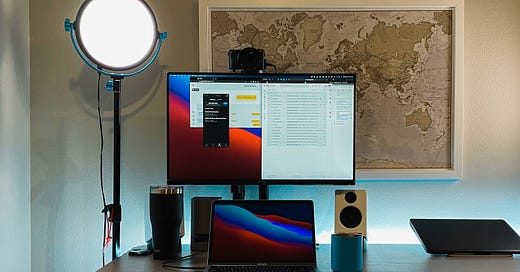While I was creating The Gray Area of Remote Work I was continuously second-guessing if it was a true film. It took until I had half of the first episode done for me to see that it was, and it was really good.
So what is remote filmmaking? Actually, what is filmmaking?
Filmmaking (or, in any context, film production) is the process by which a film is made. Filmmaking involves a number of complex and discrete stages including an initial story, idea, or commission, through screenwriting, casting, shooting, sound recording and pre-production, editing, and screening the finished product before an audience that may result in a film release and an exhibition. Filmmaking takes place in many places around the world in a range of economic, social, and political contexts, and using a variety of technologies and cinematic techniques.
There's a lot there, but if you really boil it down, remote filmmaking does all of the above perfectly and does it with fewer boundaries.
Just 50-60 years ago making a film was nearly impossible for the average storyteller. Before the home camcorder, making a video of any sort was only for a high-budget professional. When the camcorder became more affordable and slowly digitized, the medium of storytelling through video became democratized. Once we mix in computers and good digital editing software, anyone with an idea can bring it to life in varying degrees of production quality.
Today, the tech is superb. Be it your smartphone, DSLR, or even webcam – a story can be told with no friction. So why buy or rent tons of gear, rent a space, hire talent, etc. You can likely use what you have. People do this all the time. They become indy filmmakers, YouTubers, etc.
But what about the idea of making a film without leaving your home?
Traditionally this would have been considered super low production, no texture to the narrative, not a real film. But due to the pandemic people are seeing things like this differently. The limitation of making from home is not just a limitation anymore, it is more of a creative constraint.
I was hesitant to call this filmmaking too. I originally thought my docu-series was going to be about remote work, but mainly shot in person if the participant was within reasonable traveling distance. Due to the pandemic, this changed to 100% remote. Because I allowed myself to use this as a creative constraint rather than a limitation I was able to reach so many more people and tell the story through the medium of the story itself.
Since the tools and medium are no longer a limitation and we give ourselves the agency to create this way without thinking of it as less than, we open a whole new world of creativity. In addition to creativity, we help so many other facets of life.
Filmmaking is insanely wasteful. Even small budget productions create waste. That waste can be in the physical form of props, grip waste (tape, glues, single use plastics), on set food and refreshments, and of course CO2 to get to the location. Additionally, we create waste by shooting one off b-roll for every film.
By creating remotely, most of that is lessened or even eliminated. Shooting locally, interviewing remotely, even reusing footage or sourcing stock footage can reduce so much waste. These films do not have to be majorly impacted either. I am not saying that your next feature or indy will be shot 100% remotely, but your documentary or promo for that next big app could be. Your next feature or indy can even supplement some filming with remote filming. This will also allow for a more diverse set of people to partake, people that might not normally be able to for a myriad of reasons.
Being a minimalist and an environmentalist I was a bit ahead of the curve with adjusting to this change. I see beyond the negatives and see so many more positives. This style of filmmaking has also made me rethink how I shoot and what gear I need to accomplish it. I have never had a crazy amount of gear, but it has been enough to do a small production with minimal rentals. Since finishing my remote documentary, I am sizing down further because I know what really matters – the story.
I have been thinking about this new medium a lot. I created a Remote Filmmaking Checklist for you to get started with joining me on this journey. If you don't have any need for it but you think others might, go ahead and share it.
Additionally, I am starting to consult on this topic. If you or your business could use any guidance here or would like me to speak to it, I am up for spreading this knowledge.




